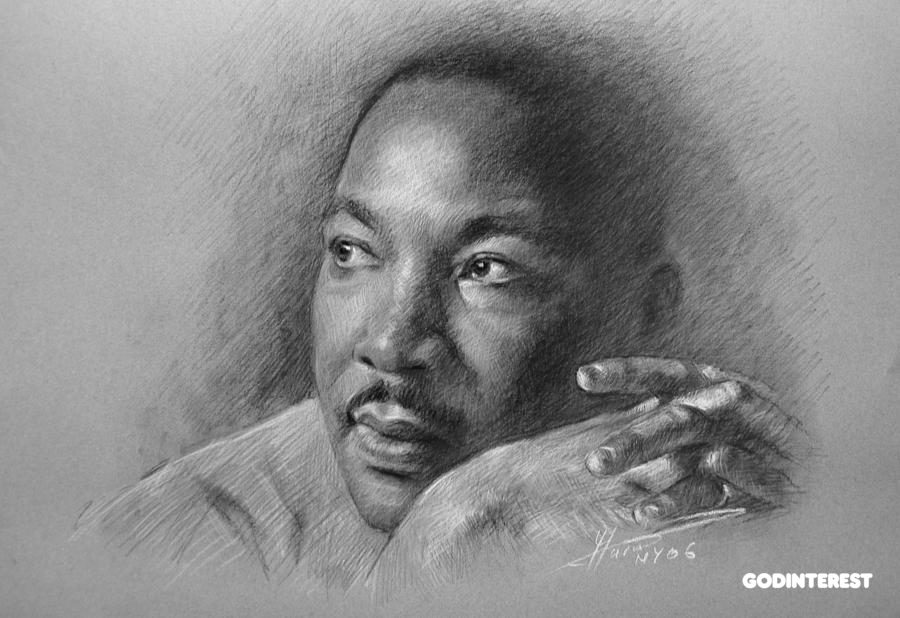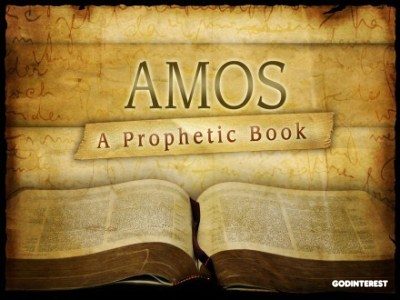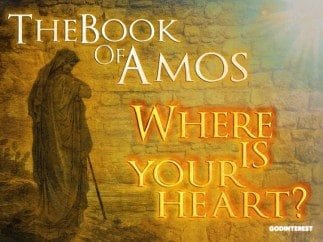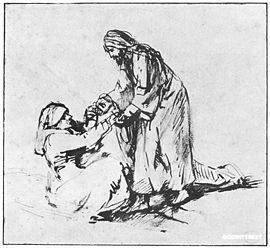
“No, no, we are not satisfied, and we will not be satisfied until justice rolls down like waters, and righteousness like a mighty stream.’”
Martin Luther King from Amos 5:24
I recently taught on the book of Amos during a study of the Twelve Minor Prophets. As I studied Amos I was able to see how it fits into the unity of these Twelve Books. There is a pattern within the individual books that make the twelve a cohesive unit. As I studied these prophets I found they all pretty much have the same basic ingredients: first there are warnings of impending judgment because of the nation’s sinfulness; second a description of the sin; third a description of the coming judgment; fourth a call for repentance; and fifth a promise of future deliverance. That is the Gospel message that we understand today.
Amos has perhaps received more critical attention than any other minor prophet. Hardly any aspect of the book remains untouched by extensive commentary. My purpose here is to focus in on one aspect of the Book of Amos. I have no intention to even begin to address the fullness of the nine chapters. Various approaches to Amos’ structure have been put forward. The book is often broken into a three-part framework that divides the book into indictments against neighboring nations, then Judah and Israel (chapters 1-2), sermons on ethical sin (chapters 3-6) and visions of the end (chapters 7-9). Our attention will be on the oracle or indictment of Israel for their callousness toward the poor and needy. The prophet will indict Israel, warn of coming judgment and then call for repentance. This I will follow with visions of the end because there is the promise of future deliverance.

Amos first indicts the leaders of Israel for their callousness toward the poor and needy including their exploitation of them for their own personal gain. “Hear this, you who trample on the needy and bring the poor of the land to an end, saying, ‘When will the new moon be over, that we may sell grain? And the Sabbath, that we may offer wheat for sale, that we may make the ephah small and the shekel great and deal deceitfully with false balances, that we may buy the poor for silver and the needy for a pair of sandals and sell the chaff of the wheat?’”
The Lord God pleads with Israel through His prophet to “Seek good, and not evil, that you may live; and so the Lord, the God of hosts, will be with you, as you have said. Hate evil, and love good, and establish justice in the gate; it may be that the Lord, the God of hosts, will be gracious to the remnant of Joseph.”
We see a patient God but not an ever patient God. We see a God who has desired through the prophets to warn His people and the nations, not only in ancient times but through all history. He warns all peoples that they will pay for their sins and transgressions if they don’t turn to Him. We see a God whose love is shown through His warnings and patience but we also see the judgment from our God based of the transgressions of the people and His need for justice.
The oppression and injustice Amos found in the Northern Kingdom was evidence that righteousness had been thrown to the ground as something worthless by those who were in power. Righteousness no longer had any meaning for the powerful people of Israel as a requirement of the worship of God.
To Amos, “hating evil and loving good” was a simple yet powerful statement of how to establish justice “in the gate.” In a very simple language, the prophet placed principles of true justice before a group of people who could argue about legal technicalities while tolerating bribery, corruption, and greed.
The gate of the city was fortified in order to protect the city from enemies and to serve as the place where the elders of the city would gather as a legal assembly to decide cases needing adjudication. The gate was the place where the local judiciary met to determine right and wrong in legal disputes, and therefore, to decide who was innocent or guilty. The gate of the city in Israel what just the opposite.
The prophet speaks, first of all, about the behavior of their judges: ‘They sell the righteous for silver, and the needy for a pair of sandals’ (Amos 8:6). Those who were rich behaved as they wanted to, without being questioned; silver passed hands and the corrupt judges convicted those who were innocent, ‘the righteous’. It was totally different for the poor. The judges were willing to sell a poor man into slavery — even though his debt might have been as small as the cost of a cheap pair of sandals — because the creditor paid the judge part of the money he received from the sale.
We can almost hear the sadness in God’s voice as, through Amos, the Lord speaks out about the lack of compassion shown by the rich people of Israel for the plight of their poor fellow countrymen. The rich and clever in Israel treated the poor like dirt and denied them justice because they were not wealthy enough to bribe the judges.

Amos indicts Israel for the oppression of the poor. The time in which Amos lived was a time of peace and prosperity for Israel. At least it was a time of prosperity in that the rich people became richer, but they became more selfish and heartless too. Originally in Israel each tribe had its own land, and each family its portion of that land, but then the rich got into their hands more and more of the land of those who were poorer. They even caused many of the poor to become their slaves. Poor people might owe a debt of no greater value than a pair of shoes, and they had to be sold as slaves to pay it (Amos 8:4-6 and 2 Kings 4: 1). In many different ways the rich ‘trampled the head of the poor into the dust of the earth’. They only cared to get more money for themselves. They oppressed the poor, taking away both their land and their liberty. This was sin, grievous in God’s sight; and the people knew it but did not care. The word of Amos was that they must answer to God for it. The patience of God, however, was about to expire.
In Amos 8:9-12 the Lord lets it been known to Israel “And on that day,” declares the Lord God, “I will make the sun go down at noon and darken the earth in broad daylight. I will turn your feasts into mourning and all your songs into lamentation; I will bring sackcloth on every waist and baldness on every head; I will make it like the mourning for an only son and the end of it like a bitter day.”
“Behold, the days are coming,” declares the Lord God, “when I will send a famine on the land — not a famine of bread, nor a thirst for water, but of hearing the words of the Lord. They shall wander from sea to sea, and from north to east; they shall run to and fro, to seek the word of the Lord, but they shall not find it.”
God warns of judgment but He is a God whose love is shown through His warnings and patience. With every warning of coming judgment there is always a call to repentance, whether specifically spoken, or, as here, merely implied. Isaiah prophesied, ‘Give ear and come to me; hear me, that your soul may live’ (Isaiah 55:3). Yet these stubborn people continually refused to listen to the voice of the Lord’s prophets because they did not like what they heard. They did not want to be challenged or shaken out of their comfortable lifestyle. God was not quick to anger hoping that Israel would turn away from their sins. He was not quick to anger but He was not ever patient. His judgment was then cast on an unrepentant nation. The judgment of God is based on the transgressions of the people and His need for justice. In fact, the day of judgment did arrive, and Israel was taken away by the Assyrians, never to be heard of again. The judgment of God will come down on all unrepentant people not just Israel.
What does it mean to have justice established in the gate? I don’t think it means to have a society without distinctions, but a society without oppression or exploitation of the less fortunate, the poor and the needy. The eighth century before Christ was a period during which a privileged few in Israel were enjoying unprecedented prosperity while most Israelites were facing dire poverty. Amos forged an explicit and unbreakable link between justice toward the neighbor and righteousness before God. Amos’ ministry provided an eternal witness of God’s opposition to economic, political, and social injustice for all nations.
Amos spoke to an oppressed society and his concern for the poor and the oppressed made him a prophet for all times. Amos is also a prophet for the 21st century, a time when the worldwide gap between the rich and the poor has never been greater.
The words of Amos can be remembered by many of us today as we remember Martin Luther King, Jr., in his famous “I Have a Dream” speech in Washington, D.C. in August 1963. King brought 20th century meaning to the words of Amos: “Let justice roll down like waters, and righteousness like a mighty stream” (Amos 5:24).
The sources of oppression and injustice may look different today, but people’s concern for material prosperity reflects the days in which Amos lived. Amos’ message of God’s opposition to injustice, his criticism of the people’s worship of material things, and his witness of God’s special concern for the poor and oppressed, affirm that the worship of God in any age is worthless if social oppression and injustice are ignored.
How evident is this in 21st century America? How evident should this be to God’s people the Church? Were we brought together within the local Church to uphold a different standard of righteousness than ancient Israel? Does the care of the poor and the oppressed end in a voting booth for Christians? Vote, pay taxes and leave it to the government?

I understand that many evangelicals link the so called Social Gospel with those Churches that emphasize that Gospel apart from the teaching of sound doctrine. The attention to feeding people physically but not spiritually. The need for social justice does not preclude attention to feeding people spiritually. Bringing an individual to Christ fills them with a hope that no government or program can ever give them.
God desires to have a church full of people who don’t care if they live in comfort, but who hate evil, love good, and who devote themselves to establish justice at the gate! People who feel grief and indignation not just when their livelihood is threatened, but also when children die of starvation and anyone dies without salvation. Feeding and taking care of the poor and needy of this nation is no different in God’s eyes then it was in the days before the Assyrians came down on the nation of Israel. He is a God of justice and righteousness. He is a God whose character is unchanging, His will is immutable, His love abounding. His patience indicates His love for us but it is not endless. His justice, therefore, is swift if a nation fails to repent. America should understand that, especially with the direction it is now heading.
Think and pray about 21st century America. Think and pray about the Church’s responsibility in bringing about social justice in America. Think, however of a Christian community that fills the bellies of the hungry and also their spiritual need to be saved. Social justice will never be fulfilled on this earth, only in God’s Kingdom to come and in an eternity with Him made possible through the saving blood of Jesus’ sacrifice on our behalf. That does not mean we have the right to turn away those truly in need.
For those who turned away from their sin God offered those Israelites hope. “In that day I will raise up the booth of David that is fallen and repair its breaches, and raise up its ruins and rebuild it as in the days of old, that they may possess the remnant of Edom and all the nations who are called by my name,” declares the Lord who does this. “Behold, the days are coming,” declares the Lord, “when the plowman shall overtake the reaper and the treader of grapes him who sows the seed; the mountains shall drip sweet wine, and all the hills shall flow with it. I will restore the fortunes of my people Israel, and they shall rebuild the ruined cities and inhabit them; they shall plant vineyards and drink their wine, and they shall make gardens and eat their fruit. I will plant them on their land, and they shall never again be uprooted out of the land that I have given them,” says the Lord your God.” (Amos 9:9-15)
This is the same hope that we have today. This is a hope that no earthly government can ever provide. This is a hope that all who believe in Jesus as their Lord and Savior already has. As we as God’s people reach out to the truly needy it is a hope that we need to share with them. We need to teach them to pray “Thy Kingdom Come” because it is on that day that we will all see social justice.
Header artwork by Ylli Haruni — used by permission — Please visit his works at.


